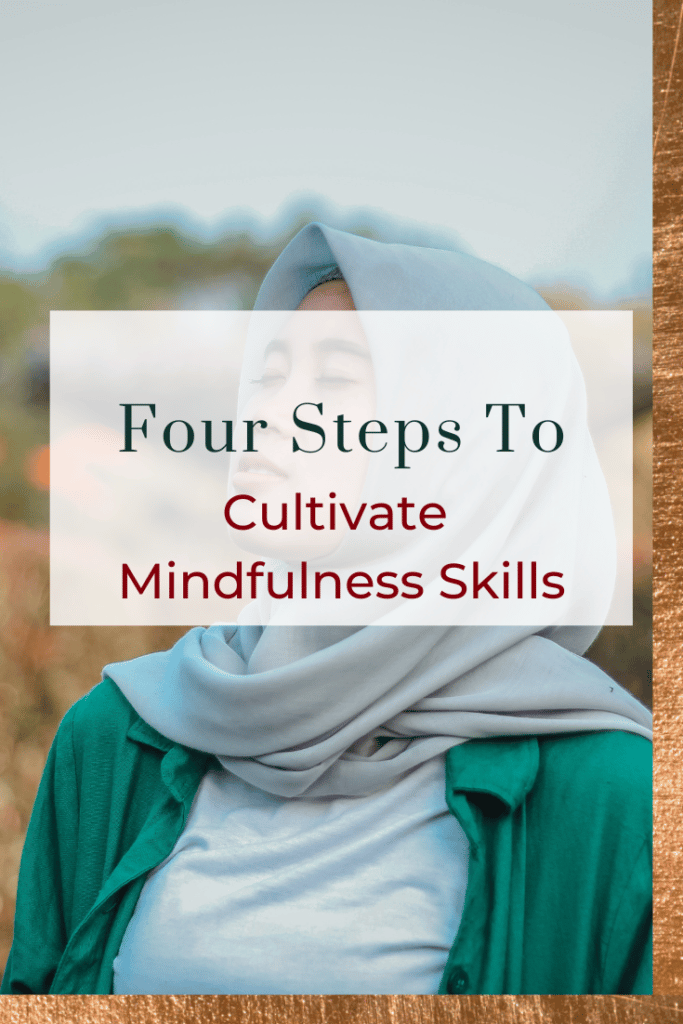How to Learn Mindfulness Skills to Support Intuitive Eating
[ad_1]
Mindfulness is a person of the most essential (if not THE most significant) abilities to discover when you are functioning on healing your romance to foodstuff and with your entire body. Go through on to listen to a lot more about mindfulness and learn mindfulness expertise to help intuitive ingesting and your overall body impression therapeutic journey.
This blog write-up contains edited excerpts from my e book Unapologetic Having.

Right before you can consider to change your behaviors about food stuff, you have to cultivate recognition and mindfulness. For the reason that if you are not informed of what thoughts, thoughts, beliefs, or experiences are impacting your romantic relationship with food items and your having behaviors, it’s likely to be definitely complicated to reconnect to your human body and consume intuitively.
(Also, understanding mindfulness competencies in typical is essential before you jump into conscious consuming.)
What is Mindfulness?
At its most basic, mindfulness is the act of paying awareness to something on intent. We can extend this definition and say that mindfulness is about bringing your recognition into the present second, in which you can purposefully recognize your ordeals in a nonjudgmental way.
Mindfulness makes it possible for you to be in the existing relatively than the earlier or the foreseeable future. The current instant consists of exterior experiences, like things that you see or hear, as very well as inside ordeals like your ideas, inner thoughts, or overall body sensations.
Mindfulness is the system of staying conscious and observing you with openness, overall flexibility, and curiosity. Rather of having caught up in your feelings and intellectualizing points, you consider a stage back, change your attention in a deliberate, intentional way and in its place notice what is taking place in that instant.
One particular of my favored descriptions of mindfulness arrives from Fiona Sutherland:
Mindfulness is a sense of ‘being with’ alternatively than ‘doing to.’
Fiona Sutherland, themindfuldietitian.com.au
When practicing mindfulness, you are not making an attempt to coerce by yourself to do anything as a substitute, you are letting yourself the area to notice and notice what is likely on—whether that is externally about you or internally within your brain.
Why Mindfulness is Important
Both of those inner occasions (this sort of as ideas like physique criticisms or comparisons, emotions like shame or anxiety, or overall body sensations like bloating or tiredness) and exterior events (like checking out the health practitioner, striving on clothes, looking in the mirror, or looking at a journal protect) can provoke destructive or upsetting feelings and thoughts.
These views and thoughts could trigger you to try to “fix” them or numb and steer clear of them by engaging in unsafe actions and behaviors. When it will come to healing your marriage with foods and your overall body, mindfulness enables you to:
- Recognize the certain experiences, ideas, and thoughts that trigger you to sense suffering.
- Let for room to notice your encounters as they are happening.
- Create a “pause” to react to your encounter alternatively than pushing it absent (numbing and preventing) or reacting to it (fixing).
As a result of the course of action of practicing mindfulness, you begin to make a lot more consciousness of the different internal and exterior experiences that can bring about unhelpful views and inner thoughts.
When you can look at your ordeals as experiences—without attaching to them or staying away from them—then you can reply somewhat than respond.
How Studying Mindfulness Can Guidance Intuitive Ingesting
The constant chatter in your brain about foods and your body – a lot of it (or all of it) educated by diet program society – simply cannot be turned off. As significantly as we may wish we could flip a switch, we can not.
But you can work on lowering the quantity a little bit and, in performing so, refuse to allow the chatter dictate your foods (and daily life) selections. Mindfulness enables you to come to be conscious of the feelings and beliefs that are dictating your food decisions, make your mind up if they’re useful or not, and respond to them somewhat than reacting by undertaking what they say.
Mindfulness can also support you to create more recognition of your entire body cues, permit you to get curious at mealtimes, and make additional of a link and have confidence in with your entire body.
Illustrations of Mindfulness and Intuitive Having
For case in point, a client of mine employed her mindfulness expertise to observe that when she ate a more substantial breakfast, not only did she have more electricity during the working day, but she also did not have to have as a great deal caffeine and – devoid of even trying – finished up consuming a lot less coffee. She then found that when she drank considerably less espresso, her stress and anxiety and her acid reflux both improved for the duration of the day.
A different consumer of mine utilized mindfulness to become far more informed of the techniques in which she disregarded or tried to suppress her starvation during the day. She also discovered how this ended up actively playing out later on on: the times in which she waited too extended to consume, ignoring her starvation right until it was “time” to try to eat, she finished up sensation significantly extra out of command with food items and disconnected from her overall body.
Even though the eating plan society programming may well by no means totally go absent, mindfulness allows you the area to make a decision that is far more in line with what you and your entire body need to have.
How Mindfulness Can Support with Entire body Image Healing
Mindfulness can enable you see the different behaviors that you have interaction in and be in a position to have a better comprehending of no matter whether they are valuable or not so valuable.
After you have that awareness, you are then capable to get a “pause” to notice what is likely on and then consciously select how you are heading to answer alternatively than just react to the cue.
Mindfulness can also help you recognize your automated ideas and then pause to feel of some different ideas that don’t scapegoat your body.
For instance, when a pair of trousers truly feel limited, your very first assumed may well be, “My overall body is the difficulty I will need to shed fat.” You can then use mindfulness to see this believed and just take a pause to appear up with an substitute, extra handy reaction:
“My physique is changing, and these trousers no for a longer period suit, so I will need to get new trousers.”
Whereas automatic thought blames or pathologizes your body, the alternative believed will come from a helpful place, a put that is aligned with your values and allows you reply to on your own somewhat than disgrace or blame your overall body.
Mindfulness also enables you to be with your body, your ideas, your thoughts, and your encounters. It is in this “being with” and “sitting with” spot that expansion and change take place.
Four Methods to Cultivate Mindfulness
The initially phase to training mindfulness is to notice and bring awareness to your working experience. From there, you are going to observe shifting your consciousness and producing a “pause” involving your practical experience and your reaction.
Then you are going to interact in curiosity as you request some thoughts to dig deeper into your working experience and your ideas, feelings, and beliefs about that expertise then you’ll choose how you want to respond. Let us dive in.
Step 1: Noticing
To build abilities in “pausing” among your knowledge and your reaction, you 1st want to have an consciousness of your feelings, feelings, and beliefs. If you aren’t mindful of how you converse to your self and the particular phrases or phrases that you use to criticize or shame on your own, then you stop up reacting as an alternative of responding.
Below are some common ideas related to foods, eating, and system impression that you may well detect:
- Procedures – about what you must or should not try to eat, how you really should look, and so on. Phrases like always, hardly ever, right, wrong, must, shouldn’t may well signify policies.
- Judgments – about the food you are having, your overall body, your emotions, and so on (ordinarily negative). Terms like very best, worst, wonderful, terrible, not ample may signify judgments.
- Previous and potential feelings – these types of as worrying, fantasizing, blaming, predicting the worst, reliving earlier ordeals, regretting, ruminating on round views, or blaming. Phrases that could signal a previous/future considered: if only, I can not wait until eventually, what if X takes place, I just cannot imagine I, why did it materialize, I need to have.
Observe becoming additional aware of the feelings that are popping up in your head through the working day. It may possibly be practical to generate these down, having particular and crafting down the words and phrases and phrases that go through your mind.
Move 2: Pausing and Shifting Attention
Following you recognize the views that you are obtaining, it is time to insert the “pause.” This is where by you can provide even more recognition to how you speak to you, what inner thoughts or overall body sensations you expertise, and in which your mind goes the moment you have that initial assumed.
For illustration: “When I consume sweets after meal, I have the assumed that I have no willpower or self-control. Then I start heaping on the judgment and disgrace.”
Right here you are working towards separating you from your thoughts. You can use the phrase “I’m possessing the assumed that _______.”
This shifting of consideration from the believed you are owning to the act of observing your thoughts (and your response to the ideas) is what lets for actual neurobiological shifts to occur.
That is correct: Your mind will begin to improve as a final result of redirecting your focus! It can truly feel challenging in the instant, but practicing will aid you to be superior able to tolerate and take care of soreness.
Step 3: Use Curiosity
At this place, you have noticed your thoughts and shifted awareness by inserting a “pause.” Within just that pause, it is time to observe cultivating curiosity about your working experience, thoughts, and feelings.
Often our preliminary believed normally is followed by a (usually adverse) judgment. If you as an alternative have interaction in curiosity, you have the option to strategy what is going on in your head with openness, desire, and compassion.
Attempt to pay attention and recognize. Pay notice to what you are feeling. Detect any actual physical sensations in your entire body.
Get curious and talk to on your own:
- Exactly where are these emotions coming from?
- Why might you be feeling the way you are?
- What may perhaps have transpired that triggered these thoughts or thoughts?
Try out to get a improved knowledge of where by your feelings came from and what beliefs you could keep that have led to them.
Move 4: React
If you normally respond to an encounter by disconnecting and pushing it away, or by attaching to it and spiraling into damaging, judgmental thoughts, this 4-stage mindfulness procedure offers you room to reply.
For quite a few of my clients, specified encounters, no matter if interior feelings or exterior functions, cause them to want to diet program and/or work out to “fix” their bodies. This is a reaction. With mindfulness, soon after you have taken a action again and established a “pause” to take a look at, you in its place can determine how you want to answer to the expertise that you are owning.
When responding, it is helpful to use self-compassion. A fantastic position to get started is “What would I say to a buddy correct now?” or “How would I treat a pal who was in this placement?”. Try to react to you with that same compassion.
For example, when a customer of mine was starting off to go into a disgrace sprial just after trying on trousers that no for a longer period match, I questioned her what she would say to a buddy who had that similar practical experience. Her solution was, “I’d inform them that bodies are not supposed to continue to be the same and that it is all right if you will need to buy a distinctive size of pants.”
Then that became some of the self-compassionate self-communicate she used towards herself in that minute.
Honing these mindfulness competencies is really hard operate but, with ongoing practice, you will get started to see much more shifts and far more tolerance in your capability to “sit with” your encounters, responding somewhat than reacting.
Keep in mind the neurobiology: when you redirect your head, make house to discover, and have interaction in curiosity, you can basically start to adjust your brain.
Are you hunting for additional help?
Test out my study course Unapologetic Having 101, an on the net, self-paced application to assist you liberate oneself from dieting and make peace with foodstuff and your body.
My group and I also give digital a single-on-one nutrition therapy aid: check out out our digital intuitive feeding on nutrition coaching deals for additional info.
My e book, Unapologetic Consuming: Make Peace with Food stuff and Completely transform Your Everyday living, is also a excellent resource that incorporates information, exploration, and reflection prompts to aid you move absent from dieting and appear again home to your overall body, so you can reside your most unapologetic, liberated lifetime.
[ad_2]
Supply backlink




